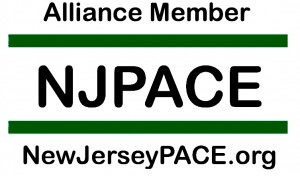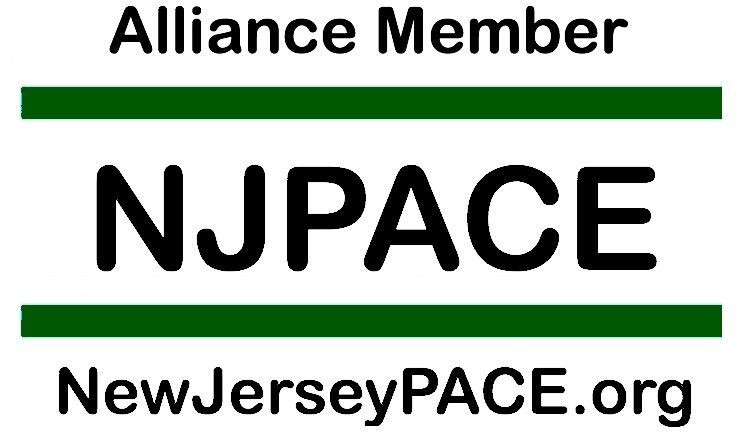UPDATES:
3/23/2023: New Jersey’s C-PACE legislation was signed into law by Governor Phil Murphy on August 21, 2021. Guidelines and regulations are expected to be published soon.
Older:
Further Update on PACE Legislation in New Jersey (1/5/2021)
Latest Update on PACE in New Jersey (9/24/2020)
NJ About to Take a Giant Step Toward Greater Energy Efficiency
New Jersey PACE Bill Moves Forward — Cautiously (and there are alternatives available!)
New Coalition for PACE in New Jersey Launched
Governor Issues “Conditional Veto” of PACE Bill
Highlights of the 2015 New Jersey PACE Summit …and Conference Materials
Supported by:
 This is an interactive working site for the NJPACE Alliance – for businesses, individuals, agencies, communities and nongovernmental organizations – that are supporting the nonprofit New Jersey PACE Program. These networks overlap and intersect at several points; the goal is to provide our staff and partner companies with access to the right organizations and contacts for their purposes. Most of the site is public, but some information is available to members or staff only.
This is an interactive working site for the NJPACE Alliance – for businesses, individuals, agencies, communities and nongovernmental organizations – that are supporting the nonprofit New Jersey PACE Program. These networks overlap and intersect at several points; the goal is to provide our staff and partner companies with access to the right organizations and contacts for their purposes. Most of the site is public, but some information is available to members or staff only.
- Click HERE for the latest Alliance entries
- Return to the New Jersey PACE site
To become a member, please register and give us your information, and we’ll contact you regarding membership.
If you’re already registered, log in here.
About the Alliance for NJPACE
PACE represents a potential multi-billion-dollar annual investment opportunity in New Jersey, creating as many as 85,000 new jobs, and lowering NJ’s carbon emissions by as much as 14%. NJ’s PACE legislation, passed in 2012, enables municipalities to create special assessment programs, and to issue or obtain bonds to finance them. Amending bills now before the NJ Legislature will expand PACE to cover water conservation, hardening and resilient construction, and will explicitly permit third-‐party administration and private financing.
A wide range of businesses and industries have a strong interest in seeing the New Jersey PACE program come into full fruition. Commercial property owners, energy auditors and contractors, equipment manufacturers, and financial institutions all play an important role in expanding what is already a world-‐class renewable energy and efficiency sector, and all stand to benefit significantly.
PACE has been described as the first truly effective long term financing model for upgrading our built environment to meet the requirements of a more resilient future.
The NJPACE Alliance will bring together many of the major players to provide advocacy, outreach, and education for the industry as well as for elected officials, public administrators, and commercial, industrial, and major nonprofit property owners throughout the state.
The National Picture
PACE legislation is available in 31 states, including New Jersey. However, significant obstacles to its widespread adoption and rapid implementation remain. Lack of awareness and acceptance on the part of municipal officials, property owners, and funding sources is the most significant factor, but differences in legislative authority, state support, and lender acceptance are also important.
Our buildings account for 45% of our energy consumption and our carbon pollution. A recent Rockefeller Foundation study found that PACE is part of an investment opportunity of nearly $280 billion in the U.S. over the next ten years, resulting in more than $1 trillion in energy savings, 3 million jobs, and resulting in 600 million fewer tons of carbon pollution each year.[1]
New Jersey
The cost of energy, and especially of electricity, is also a source of major concern in New Jersey. According to the 2011 NJ Energy Master Plan,
As of May 2011, New Jersey’s retail electric rates remain among the most expensive in the nation. … For New Jersey’s economy to grow, electricity costs must be comparable to costs throughout the region, and ideally to the U.S. as a whole. Electric energy costs have a significant effect on the economic well being of commercial and industrial (C&I) customers. High electricity prices discourage new manufacturing and commercial entry, and may cause electricity-intensive industries to relocate. Against the backdrop of the recent recession, businesses hesitate to expand in part due to high electricity prices.
The EMP also notes,
The most cost-effective way to reduce energy costs is to use less. Passive energy conservation, the use of energy- efficient appliances, equipment building materials / practices, and active DR programs result in the reduction in total energy use. Reducing customer usage during on-peak hours to ensure reliable electricity during the hottest and most humid days of the year is less costly than expanding the supply chain infrastructure—new power plants, transmission lines, and both primary and secondary distribution facilities.
And again:
The C&I sector represents 65% of the overall electric power used in the State and returns the greatest savings for the dollars invested. Identifying opportunities for EE in this sector will require outreach to thousands of businesses, building owners, and lessees. Success will depend upon the ability to deliver improvements that reduce energy use and costs immediately, with a reasonable pay back period on investments.
The challenge of reducing our building energy use by even one third is an enormous one. Yet we have to achieve this if we are going to meet the targets set out in the Energy Master Plan, to achieve at least 70% clean energy by 2050.
New Jersey has over $960 billion in existing real estate value, of which approximately $206 billion is classified as non-residential — commercial ($142 billion) industrial ($37 billion), and the rest (farms, apartments, etc. $28 billion). But this sector includes a disproportionate share of energy consumption, approximately 36% vs. 24% (with the rest being transportation). Investing, e.g., $8 billion in this sector is equivalent to about 4% in current asset value, but will result in energy savings of more than $1 billion a year and increase total valuations by more than 8% for the properties involved.
In addition, much of NJ’s C&I is older and needs “hardening” and resilient reconstruction to meet more frequent and extensive floods, storms and an overall climate-‐uncertain future. The 2013 legislation, if approved, will add resiliency improvements to NJPACE’s coverage. The proposed bill will significantly increase the potential for an enhanced C&I infrastructure as well as economic development through PACE investments for years to come.
PACE is part of an investment opportunity of nearly $280 billion in the U.S. over the next ten years, resulting in more than $1 trillion in energy savings, 3 million jobs, and 600 million fewer tons of carbon pollution each year.[2]
According to the Center for American Progress:
Investments in a clean-energy economy will generate major employment benefits for New Jersey and the rest of the U.S. economy. Our research finds that New Jersey could see a net increase of about $4.6 billion in investment revenue and 48,000 jobs based on its share of a total of $150 billion in clean-energy investments annually across the country. This is even after assuming a reduction in fossil fuel spending equivalent to the increase in clean-energy investments.
Clean-energy investments create 16.7 jobs for every $1 million in spending. Spending on fossil fuels, by contrast, generates 5.3 jobs per $1 million in spending.[3]
Joining the NJ PACE Alliance
New Jersey PACE, a NJ nonprofit, acts as program administrator for municipalities at no cost to taxpayers. We assist municipalities, property owners, contractors and investors by processing each PACE project from application to closing to final approval. By using best practices from other state programs, including standardized forms and procedures, we keep paperwork and costs to a minimum. Reasonable project-related out-of-pocket costs are reimbursable and included in the total project funding.
PACE financing is widely seen as overcoming most, if not all of the barriers to implementing clean energy improvements. The NJPACE Alliance will help commercial, industrial and non-profit property owners across our state access relatively low-cost private capital to take advantage of this game-changing program.
We are seeking trade and industry allies to support the development and expansion of this important new program, and work with us to advocating for municipal adoption, the amending legislation, and state support.
For more information or to become an Alliance member, please register and/or contact:
Victoria Zelin, Director of Development vzelin@newjerseypace.org Cell: 908-507-3150
8 Revere Drive, Basking Ridge, NJ 07920 Office: 908-396-6179 Fax 908-842-0422
[1] Source: 2012 Rockefeller Foundation study, cited by PACENow.
[2] Source: 2012 Rockefeller Foundation study, cited by PACENow.
[3] Center for American Progress, “Clean-Energy Investments Create Jobs in New Jersey.”


